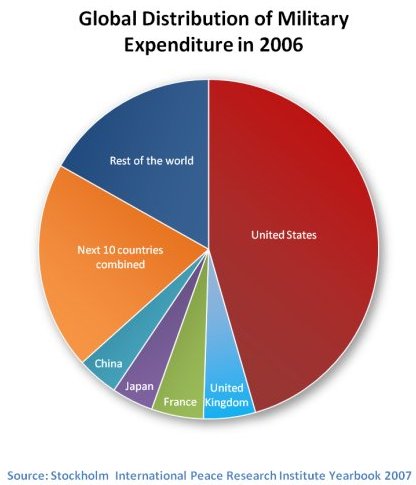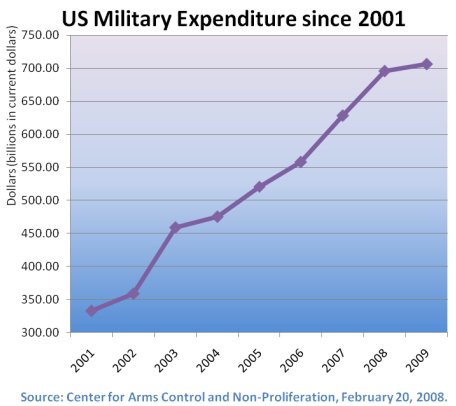US Military Still Bloated
Posted: Tue Aug 18, 2009 9:43 pm
How Many Enemies, How Much Military Spending?
Doug Bandow
Senior Fellow at the Cato Institute
Excerpts:
Given a list of 18 potential enemies of the U.S., a majority of the American population rated only North Korea and Iran as adversaries. Other nations, ranging from Venezuela to China, came in far behind.
If the American people are right, what explains today's military budget?
...
Two decades ago this justification for America's anomalous, quasi-imperial system disappeared. The Soviet Union dissolved, the Warsaw Pact disbanded, China adopted the market, and Third World states jettisoned collectivism. Colin Powell famously observed that he was running out of enemies, being left with only North Korea's Kim Il-sung and Cuba's Fidel Castro--nasty characters, but pitiful replacements for Joseph Stalin and Mao Zedong.
Yet the U.S. essentially has maintained its Cold War military. Defense spending dipped in the early 1990s, but real outlays merely dropped from the Reagan build-up back to the Cold War average. Since then military expenditures (the baseline budget excluding costs of Afghanistan and Iraq) have climbed to a peacetime record. America accounts for nearly half of the world's military outlays.
That is, Washington is spending more today on its military now than it did when the U.S. was confronting the Soviet Union, Warsaw Pact, Maoist China, and assorted Third World autocracies.
Whatever could justify such outlays?
It certainly isn't the power of America's enemies. The American people rightly rank North Korea and Iran as adversaries of the U.S. But neither state poses even a minor threat to America.
The so-called Democratic People's Republic of Korea is an economic wreck; a half million or more people starved to death a decade ago. The regime is largely friendless and faces a destabilizing leadership transition. Pyongyang's large military is antiquated; though the North is developing both missile and nuclear technologies, it has no present ability to attack the U.S. and, in any case, would be wiped out by any retaliatory strike.
Moreover, the DPRK is constrained by its neighbors. South Korea enjoys 40 times the economic strength, twice the population, and a vast technological advantage. By some measures, the South's military budget is as large as North Korea's entire GDP. With its more modern, efficient military, Seoul alone could defeat the North.
Iran is a military midget, at least compared to America. Tehran's estimated military outlays run about $8 billion annually--less than two percent of America's level. Iran's military has been untested for two decades, and much of the Iranian security apparatus is directed at domestic repression. U.S. intelligence doesn't believe Iran has an active nuclear weapons program underway, though the regime's nuclear energy efforts might be aimed at creating a "turnkey" weapons capability. In any case, one American carrier group could do far more damage to Iran than the entire Iranian military could do to the U.S.
...
The only real potential adversaries with meaningful military capabilities are Russia and China.
But the former is a declining power, whose geopolitical ambitions vastly exceed its capabilities. Moreover the European Union alone has ten times Russia's economic strength, three times Russia's population, and twice Russia's military budget. China's strength is on the rise, but it remains a relatively poor nation whose military remains far behind that of America. It will take years, even decades, for Beijing to fulfill its potential. One statistic alone captures America's dominance: the U.S. possesses 11 carrier groups, compared to one between China and Russia.
Washington spends as much as it does on the military to enable it to attack other nations, not defend itself. Most of America's outlays on "defense" have nothing to do with defense. The Pentagon really has become the Department of Offense.
...America's business should be defense, not offense. Especially at a time of economic crisis and budget stringency, the U.S. should bring its military establishment into alignment with its defense needs.
The American people recognize what Colin Powell told us a few years ago: the U.S. is running out of (serious) enemies. It is time to cut the military budget accordingly.
Huff Po
MORE:

Center for Arms Control and Non-Proliferation:
(February 22, 2008)
* The United States spends more than the next 45 highest spending countries in the world combined.
* The United States accounts for 48 percent of the world's total military spending.
* The United States spends on its military 5.8 times more than China, 10.2 times more than Russia, and 98.6 times more than Iran.
* The United States and its strongest allies (the NATO countries, Japan, South Korea and Australia) spend $1.1 trillion on their militaries combined, representing 72 percent of the world's total.

"The United States maintains over a thousand overseas military bases, most of which serve no purpose other than maintaining a megalomaniac fiction of American military superiority. They are often resupplied by private contractors whose procurement operations rely on the domestic civilian economy. As long as the economy is intact, they can bring three flavors of ice cream to an air-conditioned tent in the middle of the desert, but once the economy collapses, they will collapse with it, and the military may turn out to lack even the resources to truck in water. Overseas military bases should be dismantled and the troops repatriated." pp. 111-112
- Dmityr Orlov forecasting American economic collapse in his book,
Reinventing Collapse Soviet Example and American Prospects (from his 2008galley)
LINK
Doug Bandow
Senior Fellow at the Cato Institute
Excerpts:
Given a list of 18 potential enemies of the U.S., a majority of the American population rated only North Korea and Iran as adversaries. Other nations, ranging from Venezuela to China, came in far behind.
If the American people are right, what explains today's military budget?
...
Two decades ago this justification for America's anomalous, quasi-imperial system disappeared. The Soviet Union dissolved, the Warsaw Pact disbanded, China adopted the market, and Third World states jettisoned collectivism. Colin Powell famously observed that he was running out of enemies, being left with only North Korea's Kim Il-sung and Cuba's Fidel Castro--nasty characters, but pitiful replacements for Joseph Stalin and Mao Zedong.
Yet the U.S. essentially has maintained its Cold War military. Defense spending dipped in the early 1990s, but real outlays merely dropped from the Reagan build-up back to the Cold War average. Since then military expenditures (the baseline budget excluding costs of Afghanistan and Iraq) have climbed to a peacetime record. America accounts for nearly half of the world's military outlays.
That is, Washington is spending more today on its military now than it did when the U.S. was confronting the Soviet Union, Warsaw Pact, Maoist China, and assorted Third World autocracies.
Whatever could justify such outlays?
It certainly isn't the power of America's enemies. The American people rightly rank North Korea and Iran as adversaries of the U.S. But neither state poses even a minor threat to America.
The so-called Democratic People's Republic of Korea is an economic wreck; a half million or more people starved to death a decade ago. The regime is largely friendless and faces a destabilizing leadership transition. Pyongyang's large military is antiquated; though the North is developing both missile and nuclear technologies, it has no present ability to attack the U.S. and, in any case, would be wiped out by any retaliatory strike.
Moreover, the DPRK is constrained by its neighbors. South Korea enjoys 40 times the economic strength, twice the population, and a vast technological advantage. By some measures, the South's military budget is as large as North Korea's entire GDP. With its more modern, efficient military, Seoul alone could defeat the North.
Iran is a military midget, at least compared to America. Tehran's estimated military outlays run about $8 billion annually--less than two percent of America's level. Iran's military has been untested for two decades, and much of the Iranian security apparatus is directed at domestic repression. U.S. intelligence doesn't believe Iran has an active nuclear weapons program underway, though the regime's nuclear energy efforts might be aimed at creating a "turnkey" weapons capability. In any case, one American carrier group could do far more damage to Iran than the entire Iranian military could do to the U.S.
...
The only real potential adversaries with meaningful military capabilities are Russia and China.
But the former is a declining power, whose geopolitical ambitions vastly exceed its capabilities. Moreover the European Union alone has ten times Russia's economic strength, three times Russia's population, and twice Russia's military budget. China's strength is on the rise, but it remains a relatively poor nation whose military remains far behind that of America. It will take years, even decades, for Beijing to fulfill its potential. One statistic alone captures America's dominance: the U.S. possesses 11 carrier groups, compared to one between China and Russia.
Washington spends as much as it does on the military to enable it to attack other nations, not defend itself. Most of America's outlays on "defense" have nothing to do with defense. The Pentagon really has become the Department of Offense.
...America's business should be defense, not offense. Especially at a time of economic crisis and budget stringency, the U.S. should bring its military establishment into alignment with its defense needs.
The American people recognize what Colin Powell told us a few years ago: the U.S. is running out of (serious) enemies. It is time to cut the military budget accordingly.
Huff Po
MORE:

Center for Arms Control and Non-Proliferation:
(February 22, 2008)
* The United States spends more than the next 45 highest spending countries in the world combined.
* The United States accounts for 48 percent of the world's total military spending.
* The United States spends on its military 5.8 times more than China, 10.2 times more than Russia, and 98.6 times more than Iran.
* The United States and its strongest allies (the NATO countries, Japan, South Korea and Australia) spend $1.1 trillion on their militaries combined, representing 72 percent of the world's total.

"The United States maintains over a thousand overseas military bases, most of which serve no purpose other than maintaining a megalomaniac fiction of American military superiority. They are often resupplied by private contractors whose procurement operations rely on the domestic civilian economy. As long as the economy is intact, they can bring three flavors of ice cream to an air-conditioned tent in the middle of the desert, but once the economy collapses, they will collapse with it, and the military may turn out to lack even the resources to truck in water. Overseas military bases should be dismantled and the troops repatriated." pp. 111-112
- Dmityr Orlov forecasting American economic collapse in his book,
Reinventing Collapse Soviet Example and American Prospects (from his 2008galley)
LINK